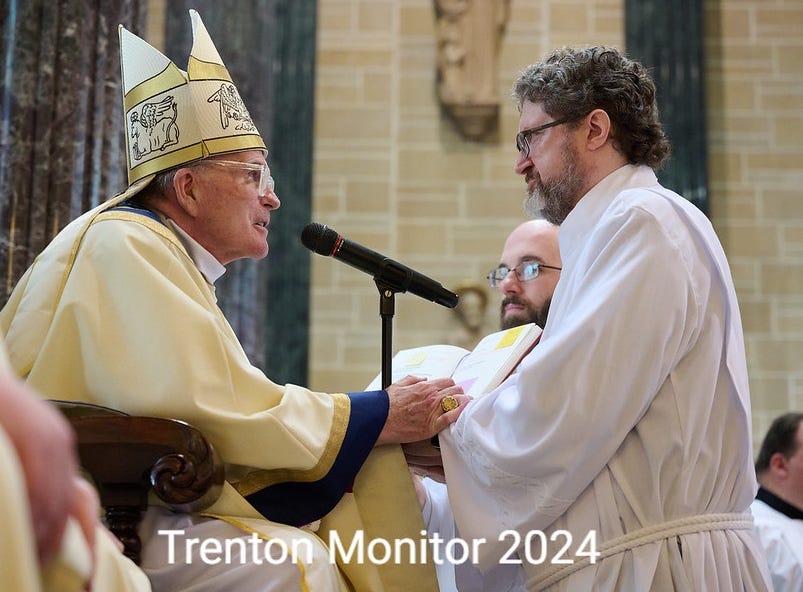The labor of obedience will bring you back
to him from whom you had drifted
through the sloth of disobedience.
This message of mine is for you, then,
if you are ready to give up your own will,
once and for all,
and armed with the strong and noble weapons
of obedience
to do battle for the true King,
Christ the Lord.
—Prologue to the Rule of St. Benedict, lines 2-3—
This is part of some ongoing reflections on The Rule of Benedict.
Obedience is out of fashion, and has been for some time now. Like most things, it’s either the fault of the enlightenment or Martin Luther. Probably both. Also: rock music and comic books.
We believe we are wholly autonomous creatures, beholden to no one and nothing but our own Promethean selves. It’s an idolatry of individualism. We worship our wills, which are weaker, more ignorant, and more unforgiving than the worst tyrant.
And yet everybody obeys someone or something. Stopping at a stop sign is an obedience. It’s also an act of prudence, which should give us a better idea of what we obey, and who, and why, and when.
I was a Libertarian before I grew up, and believed man alone was his own measure, his own king, his own teacher, his own priest. How anyone but spoiled children and perhaps Ayn Rand can continue in that delusion after the first contact with hard reality is beyond me. Life teaches us that, in the words of The Prophet Bob, “You’re gonna hafta serve somebody.” The question is who. Or rather, Who.
In the Garden with God
In the Rule, monastics are required to renounces their own desires as Jesus renounced his. The model is the Garden at Gethsemane, a passage and moment that is particularly rich for meditation purposes.
And he withdrew from them about a stone’s throw, and knelt down and prayed, saying, “Father, if you are willing, remove this cup from me. Nevertheless, not my will, but yours, be done.” And there appeared to him an angel from heaven, strengthening him. And being in agony he prayed more earnestly; and his sweat became like great drops of blood falling down to the ground. Lk 22:41–44.
Not my will, but yours be done.
There are some important things to note here. Jesus in his humanity does not want to experience what is to come, and yet in his divinity he knows he must and he will. Yet he not only makes this prayer, in Luke’s version the Father sends an angel to help steel his resolve so he can accomplish this act of obedience. And yet he prays again so urgently, with such anguish, that his sweat is like blood.
This is our example, and what it tells us is that even Christ struggled with the hard reality of obedience to the Father. Should we ask any less of ourselves if we are to imitate him, or expect it to be any less difficult?
The Work of Obedience
The other thing the passage tells us is that obedience is not submission, although the words tend to be used interchangeably. Submission is when my little dog rolls over to show her belly. It is passive.
Obedience is active. It’s work. It is hard, and it’s supposed to be. It is a strong and noble weapon, in the words of the Holy Father Benedict, and only through practice and effort do we learn how to wield it.
Submission is how we respond to our appetites, which is a form of slavery. We submit to the pull of desire, and that’s not freedom. When St. Paul says “For freedom Christ has set us free; stand firm therefore, and do not submit again to a yoke of slavery,” he is not just talking about freedom from the Law, but also freedom from sin, freedom from our appetites.
We imagine those appetites are good because if they were not, we wouldn’t have them. We yield to the movement of our own will often without pausing to consider wether or not that will is properly formed and correctly ordered. And yet we know that much of our self-willed motion is liable to misdirection. Our actions become a tyranny of the id, and our appetites can sweep us away on strong currents, leaving us drifting and directionless.
Obedience to Who?
Our obedience to God is absolute, but our obedience to man is not. (See CCC 144, 1897; ST II–II.106.5 and II–II.186.2) And so who do we obey? In monastic life, it is the abbott or abbess. In the oblate life, it is the Rule itself, which provides ample tools for good works and living. Those of us who receive Holy Orders promise obedience to our bishop and his successors. In the life of all the faithful, we obey the scripture and the teachings of the Church.
In Sacramentum Mundi, Waldemar Molinski writes:
human beings can and should be obeyed only to the extent that they share in the authority of God…. Hence man may never subject himself to other human beings as such, but can submit to them only to the extent that they stand in the service of a divinely-willed goal. Otherwise the personal dignity of the giver of the order would be placed above that of the person obeying, and so the latter would be diminished. (1)
This brings us to a problem in the Church and obedience: too often it has been twisted by Satanic men like Ted McCarrick or Marko Rupnik who subject others to their own perverse needs. This is not what obedience calls us to, because it fails the most basic test: you cannot obey a call to sin. In fact, disobeying that call is the true act of obedience.
The church needs to be far more clear on this matter, and needs to form all the faithful, but especially those under vows or promises (priests, religious, and other workers in the vineyard), just what obedience is and is not. Too much of the hierarchy, even after more than two decades of scandal, do not take these abuses of authority seriously, and so more work needs to be done on understanding obedience and living it.
We need to do it because it is worth doing. Modern man is so conditioned by an illusion of total liberty that he’s forgotten the only purpose of free will is to choose the good. Obedience to God and the teachings of the church is not an abandonment of free will or even a curtailment of genuine liberty. It is a recognition that mankind is fallen, and if he only steers by his own polestar, he will end up broken and sinking on rocks he may not even be able to see.
Beyond Self-Will
Self-will often lies beyond reason, in a purely emotional part of the mind. We can tell it is irrational because thwarting self-will yields rage: the rage of a child told no. Everything is a choice of this and not that. Every choice means drawing a line somewhere, and we are bad at drawing those lines. I don’t even need to make the case that this is true: I just need to look around me. I just need to look into my own heart. We’re a society of unleashed appetites, and when man is reduced to appetites he is inclined to sin, and ripe for tyranny.
Those of us who practice this obedience–to God, to church, to bishop, to Rule–are practicing it as an act of our own free will. It is rejection of a false freedom, and an embrace of a true freedom. In that sense, we believe we have stepped closer to finding God in that we are laying down a life driven simply by self-will, and surrendering that part ourselves to a higher authority.
We’ve made that choice because we recognize the defects in ourselves, and desire, like Christ, to let his will, not ours, be done. I became an oblate because I knew where I was failing, and that I needed help beyond what I could draw out of my own mind. I knew that alone I could do very little, but within the life of the Rule of Benedict, I would find peace in the act of surrender to something greater than myself. Everyone’s life, lay or religious, must be an effort to conform ourselves to God’s will, for only that will is perfect, and only in obeying that will can we find perfection.
For as by the one man’s disobedience
the many were made sinners,
so by the one man’s obedience
the many will be made righteous.
—Romans 5:19—
1. Waldemar Molinski, “Obedience,” ed. Adolf Darlap, Sacramentum Mundi: An Encyclopedia of Theology (New York; London: Burns & Oates; Herder and Herder, 1968–1970), 239–240.







